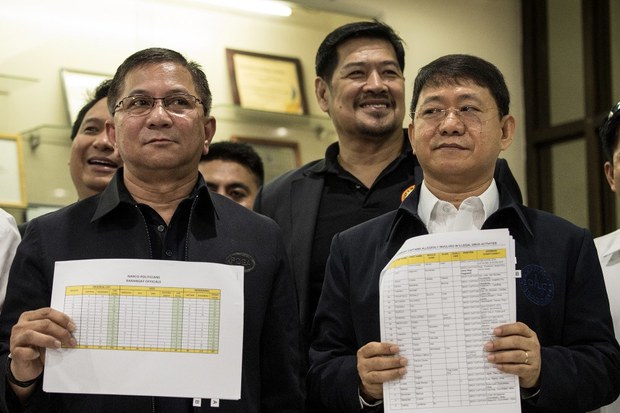Philippines Will Deny UN Access for Probe into Drug War, Officials Indicate
2019.07.23
Davao and Cagayan de Oro, Philippines
 Philippine Drug Enforcement Agency Director Aaron Aquino (left) and Interior Ministry Secretary Eduardo Año (right) hold lists allegedly containing the names of politicians involved in illegal drugs, at PDEA headquarters in Manila, April 30, 2018.
Philippine Drug Enforcement Agency Director Aaron Aquino (left) and Interior Ministry Secretary Eduardo Año (right) hold lists allegedly containing the names of politicians involved in illegal drugs, at PDEA headquarters in Manila, April 30, 2018.
The Philippine government indicated on Tuesday that it would deny access for U.N. officials investigating thousands of extrajudicial killings under President Rodrigo Duterte’s war on illegal drugs, and said it could conduct its own probe.
Granting entry to investigators with the office of the United Nations High Commissioner for Human Rights (OHCHR) will likely not happen, and allowing a foreign entity to conduct an investigation would be an “apparent violation of our sovereignty,” Interior Secretary Eduardo Año said.
“Secondly, where did they get their facts? Their facts are very different from the facts that we have. How can you allow somebody to investigate without even verifying the source of this information,” Año told reporters. “This is really a flagrant violation of our sovereignty.
Earlier this month, the U.N. Human Rights Council in Geneva voted narrowly to authorize OHCHR to probe killings that have occurred in the Philippine drug war.
“We have enough systems, courts, processes that we can do locally – and we can make sure that we will come up with an honest report and we will do that,” Año said.
During his annual state of the nation address on Monday, Duterte said he would carry on with his crackdown on narcotics until his term ended in 2022, despite widespread criticism from domestic and international human rights advocates.
“For it is not the eagle in the fight, but the fight in the eagle that matters. Believe me, I will end my term fighting,” he said.
The national police recently said that the official death toll of suspected dealers and addicts during the three-year campaign had reached 6,600, while human rights groups have said that thousands more were killed, many by vigilantes.
Duterte already faces two separate murder charges before the International Criminal Court (ICC), but rather than allowing its investigators into the Philippines, the government pulled out of a treaty that created The Hague-based body.
“It has been three years since I took my oath of office and it pains me to say that we have not learned our lesson. The illegal drug problem persists, corruption continues,” Duterte told lawmakers in his speech.
Duterte’s defiance is in contrast to a statement he made in April when he admitted that it appeared he would be leaving office without ending the drug problem. He blamed what he called “narcopoliticians” for flooding the market with drugs.
Rights advocates weigh in
The challenge is for the Philippine government to demonstrate that it values U.N. membership and is ready to fulfill its human rights obligations, said Carlos Conde, a researcher for Human Rights Watch.
“It goes without saying that it, too, must subject itself to the council’s scrutiny,” Conde told BenarNews.
A survey released by the independent Social Weather Stations this week said three of five Filipinos did not want the government to block international groups from investigating the drug war killings.
Butch Olano, who heads the local chapter of Amnesty International, also questioned Duterte’s push to re-impose capital punishment in the Catholic nation to compliment the drug war. The death penalty was abolished in 2006 when about 1,200 inmates on death row had their sentences commuted to life in prison.
The president has been pushing to revive capital punishment but faced congressional resistance. Several bills on the issue remain hanging, although Duterte now, after mid-term elections in May, virtually controls both house of congress.
“Extrajudicial killings remain rife in the Philippines. Talk of bringing back the death penalty for drug-related crimes is abhorrent and risks aggravating the current climate of impunity,” Olano said in statement.
“The president addressed the topic of drugs but did not confront the truth. The country needs an approach that delivers justice for the families of the thousands unlawfully killed, and effective health and social services for those who need them,” Olano said.
Jeoffrey Maitem in Cotabato, Philippines, contributed to this report.







